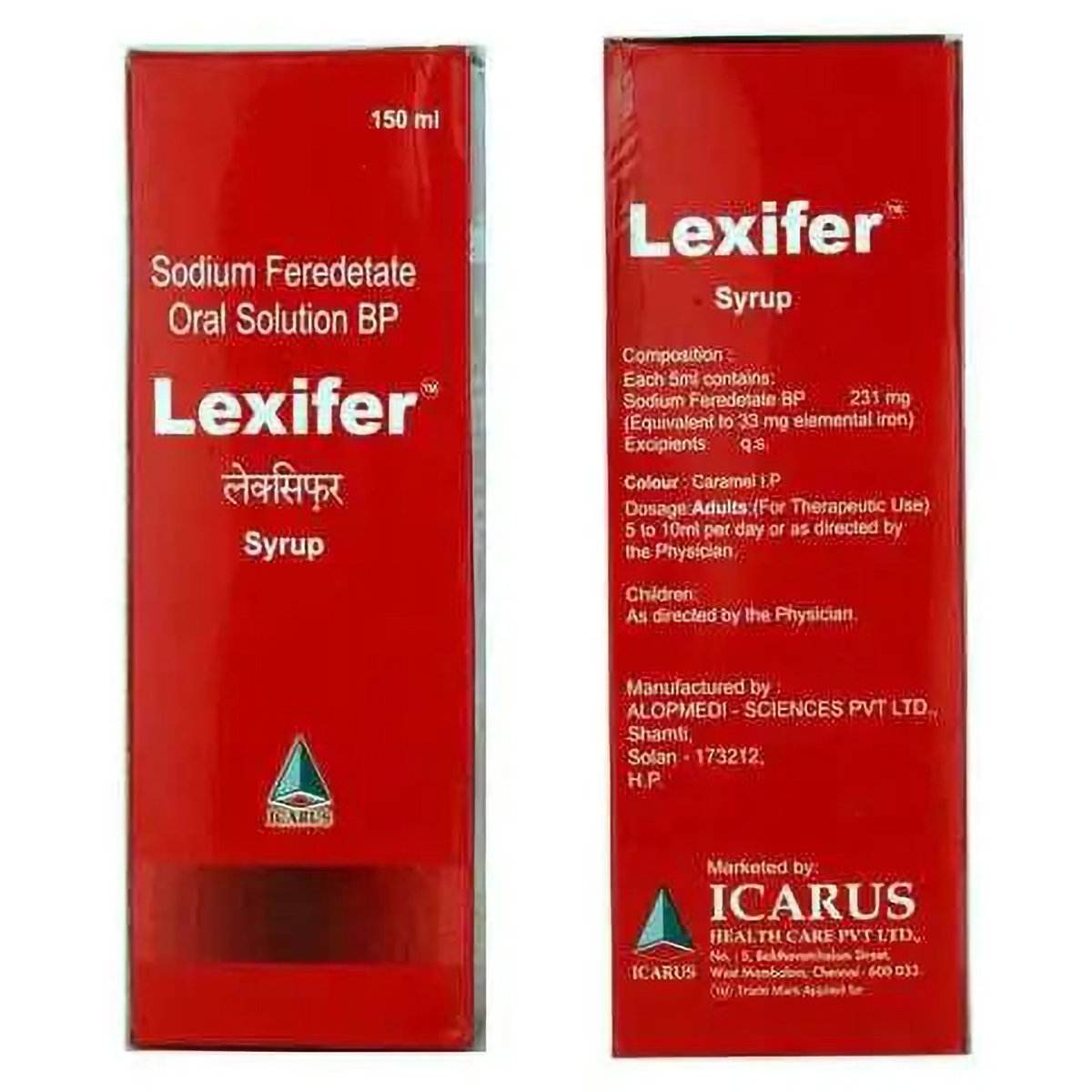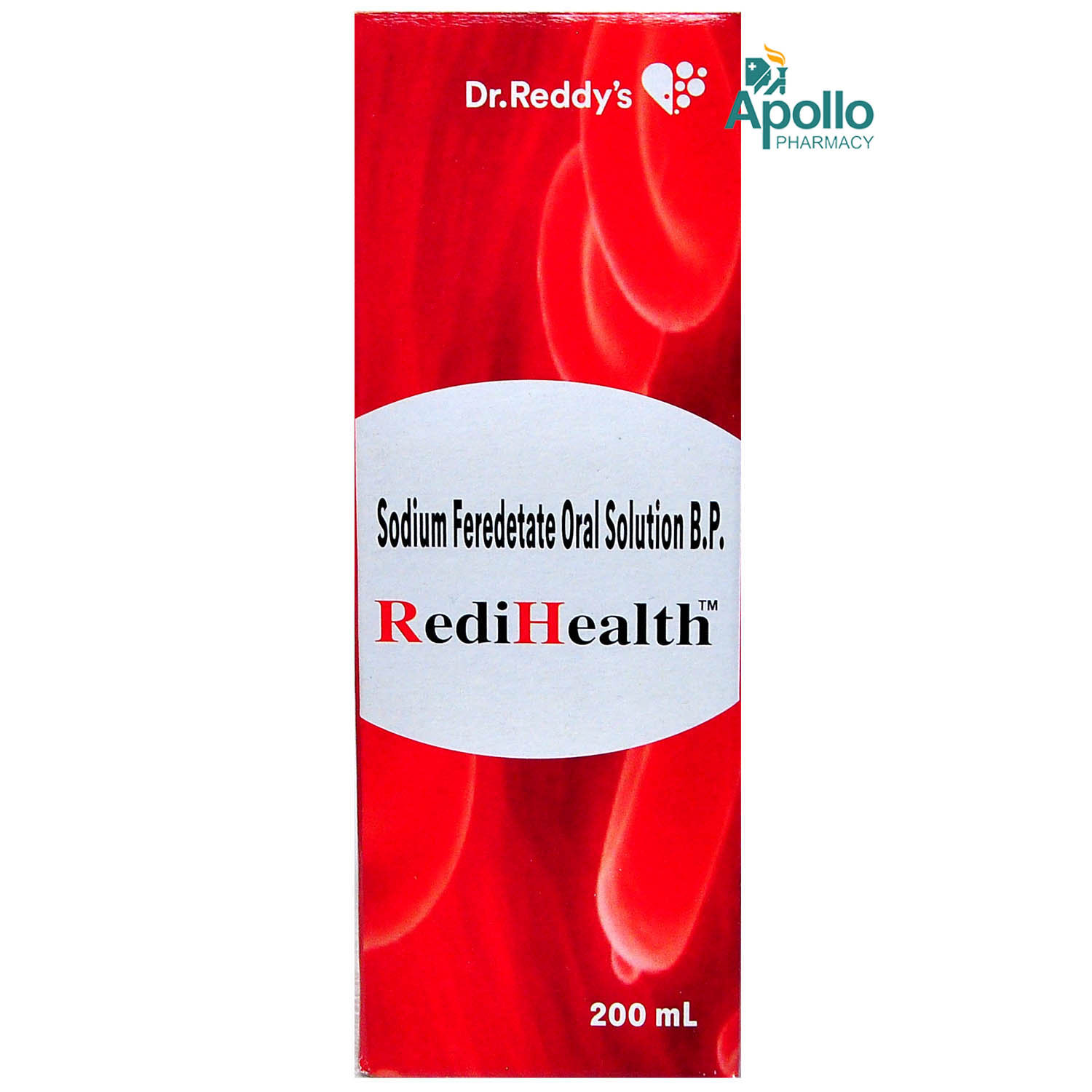Sodium Feredetate
About Sodium Feredetate
Sodium Feredetate belongs to the group of anti-anaemic medicines used to treat iron deficiency anaemia (anaemia caused by too little iron in the body). Sodium Feredetate does not cause teeth discolouration and is less likely to cause stomach upset than other iron-containing medicines. Anaemia is a condition in which the body does not have enough red blood cells for carrying adequate oxygen to various body tissues.
Sodium Feredetate contains ‘Sodium Feredetate’, which acts as a source of iron and helps in the transportation of oxygen throughout the body and production of red blood cells. Thereby, Sodium Feredetate helps in treating anaemia.
In some cases, you may experience certain common side effects such as nausea, vomiting, mild diarrhoea, flatulence, and constipation. Most of these side effects do not require medical attention and will resolve gradually over time. However, you are advised to talk to your doctor if you experience these side effects persistently.
Let your doctor know if you are using prescription/non-prescription drugs, or herbal products before starting Sodium Feredetate. If you are known to be allergic to any of the components in Sodium Feredetate, please inform your doctor. Consult a doctor before taking Sodium Feredetate if you are pregnant or breastfeeding. Sodium Feredetate should be given to children only if prescribed by a doctor. It is unknown if alcohol interacts with Sodium Feredetate, so please consult a doctor if you have any concerns.
Uses of Sodium Feredetate
Medicinal Benefits
Sodium Feredetate belongs to the group of anti-anaemic medicines used to treat iron deficiency anaemia (anaemia caused by too little iron in the body). Sodium Feredetate acts as a source of iron and helps in the transportation of oxygen throughout the body and the production of red blood cells. Thereby, Sodium Feredetate helps in treating anaemia. Sodium Feredetate does not cause teeth discolouration and is less likely to cause stomach upset than other iron-containing medicines. When prescribed, Sodium Feredetate can be taken by pregnant women when other forms of iron is not well tolerated, by children and adults who are anaemic due to rheumatoid arthritis.
Directions for Use
Storage
Side Effects of Sodium Feredetate
- Nausea
- Vomiting
- Mild diarrhoea
- Flatulence (wind)
- Constipation
Drug Warnings
Do not take Sodium Feredetate if you are allergic to any of its components, if you have iron haemochromatosis or haemosiderosis, sensitivity to iron-containing preparations, are taking iron injections or have had repeated blood transfusions. Inform your doctor if you have haemolytic anaemia, iron storage or absorption disease, gastrointestinal disease (ulcers, gastritis), liver or kidney problems. Consult your doctor if you are pregnant or breastfeeding. Sodium Feredetate should be given to children only if prescribed by the doctor. Let your doctor know if you are using prescription/non-prescription drugs, or herbal products before starting Sodium Feredetate.
Drug Interactions
Drug-Drug Interactions: Sodium Feredetate may interact with antibiotic (chloramphenicol), chelating agent (dimercaprol, penicillamine, trientine), anti-hypertensive (methyldopa), immunosuppressant (mycophenolate), anti-Parkinson (levodopa, carbidopa, entacapone), hormone (thyroxine), bile-acid sequestrant (cholestyramine), antacid (omeprazole), supplements (calcium, magnesium, zinc), bisphosphonates, fluoroquinolones, tetracyclines, bicarbonates, and carbonates.
Drug-Food Interactions: Avoid taking Sodium Feredetate with tea, coffee, milk/milk products, eggs, vitamin c (ascorbic acid), and citric acid.
Drug-Disease Interactions: Inform your doctor if you have iron haemochromatosis or haemosiderosis (iron overload), haemolytic anaemia, iron storage or absorption disease, or gastrointestinal disease.
Drug-Drug Interactions Checker List:
Safety Advice

Alcohol
cautionIt is unknown if alcohol interacts with Sodium Feredetate, so please consult a doctor.

Pregnancy
safe if prescribedIt is generally safe to use Sodium Feredetate during pregnancy. However, please consult a doctor before taking Sodium Feredetate if you are pregnant.

Breast Feeding
cautionPlease consult a doctor before taking Sodium Feredetate if you are breastfeeding.

Driving
safe if prescribedSodium Feredetate is unlikely to affect your ability to drive. However, drive or operate machinery only if you are alert.

Liver
cautionLimited data is available regarding the usage of Sodium Feredetate in patients with liver impairment. Please consult your doctor.

Kidney
cautionLimited data is available regarding the usage of Sodium Feredetate in patients with kidney impairment. Please consult your doctor.

Children
safe if prescribedSodium Feredetate should be given to children only if prescribed by a doctor.
Habit Forming
Diet & Lifestyle Advise
- Follow a well-balanced diet.
- Exercising regularly helps in improving overall health.
- Rest well, get plenty of sleep.
- Avoid smoking and alcohol consumption.
- Meditation and yoga can help lower stress.
- Avoid processed and fried food.
- Include leafy vegetables, poultry, seafood, beans, nuts, seeds, meat and fortified food in your diet.
Special Advise
- Sodium Feredetate might cause blackening/darkening of the stools and can interfere with test results. Inform the person doing the tests that you are taking Sodium Feredetate.
- Regular blood tests while taking Sodium Feredetate are advised.
Patients Concern
Disease/Condition Glossary
Iron deficiency anaemia: Anaemia is the decrease in the red blood cells or haemoglobin concentration in the blood or the lowered ability to carry oxygen. It is a condition in which the body does not have enough red blood cells for carrying adequate oxygen to various body tissues. If the body has too little iron, it cannot make enough haemoglobin. Haemoglobin is the main protein in the red blood cells, which is responsible for carrying oxygen throughout the body. Anaemia can be caused by blood loss due to ulcers, haemorrhoids, inflammation of the stomach, menstruation, or problems with bone marrow. Symptoms include tiredness, weakness, shortness of breath, light-headedness, pale skin, dizziness, or fast heartbeat.
FAQs
Sodium Feredetate helps in the transportation of oxygen throughout the body and the production of red blood cells. Thereby, Sodium Feredetate helps in treating anaemia.
Do not take Sodium Feredetate with milk or milk products (cheese or yoghurt) as it might affect the absorption of Sodium Feredetate.
Sodium Feredetate may cause constipation. Eat fibre-rich food and drink plenty of fluids if you experience constipation. Consult your doctor if you have severe constipation.
To treat your condition effectually, continue taking Sodium Feredetate for as long as your doctor has prescribed it. Do not be reluctant to speak with your doctor if you experience any difficulty while taking Sodium Feredetate.
Sodium Feredetate might cause the stools to appear darker than usual; this is due to the elimination of unabsorbed iron. Do not worry as it is common while taking iron preparations. Consult a doctor if this bothers you or if you notice blood in stools.
Tea, coffee, milk, milk products, eggs, vitamin c (ascorbic acid), and citric acid might interfere with the absorption of Sodium Feredetate. Therefore, avoid taking them with Sodium Feredetate.










